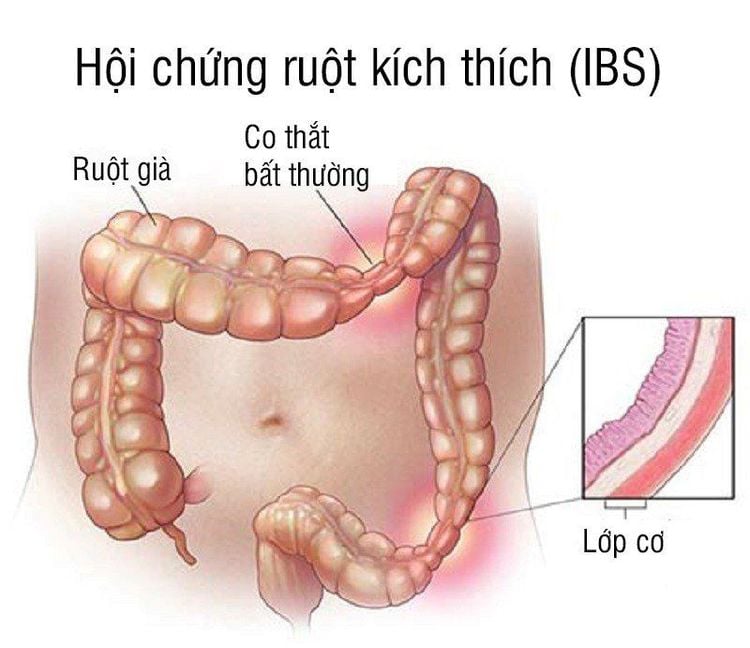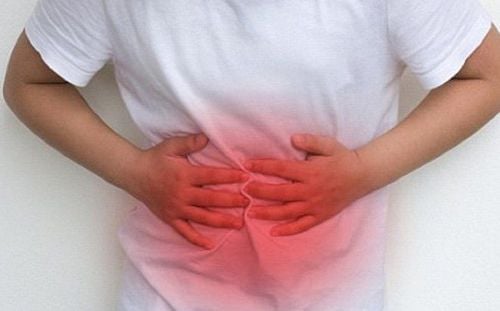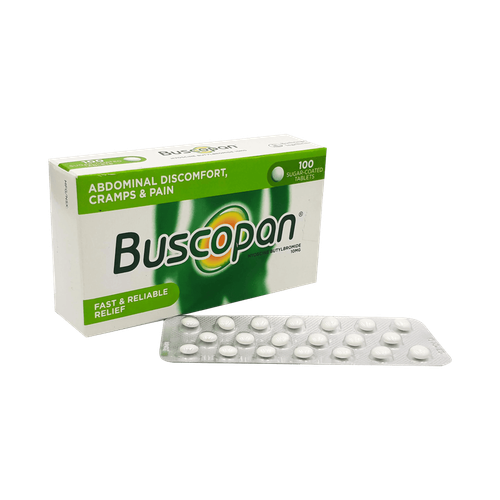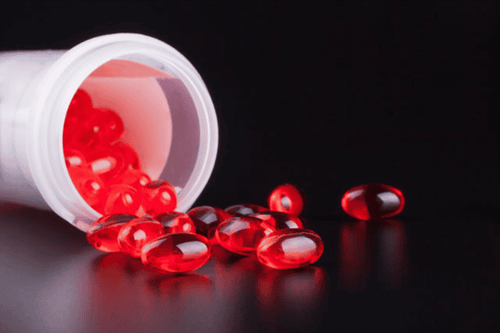This is an automatically translated article.
The article was professionally consulted by Doctor Department of Medical Examination & Internal Medicine - Vinmec Hai Phong International General Hospital
Constipation is a common form of irritable bowel syndrome. Depending on the symptoms of the disease, the patient needs to be treated with drugs and a diet that is suitable for the disease.
1. What is irritable bowel syndrome (IBS)?
Irritable bowel syndrome (IBS) is a common condition that affects the digestive system with symptoms such as gastrointestinal cramps, bloating, diarrhea, and constipation. They tend to come and go over time and can last for days, weeks, or months at a time. It is usually a lifelong problem. Living with it can be very uncomfortable and can greatly affect daily life. There is no cure, but lifestyle, dietary, and medication changes can often help control symptoms.
The exact cause is unknown - it has to do with things like food passing through your intestines too quickly or too slowly, oversized nerves in the gut, stress, and a family history of IBS.

2. How many types of irritable bowel syndrome are there?
There are three types of irritable bowel syndrome, or IBS including:
IBS with constipation. This is accompanied by stomach pain and discomfort, bloating, unusually slow or infrequent bowel movements, or lumpy/hard stools. IBS can be diarrhea. This is accompanied by stomach pain and discomfort, an urgent need to move your bowels, unusually frequent bowel movements, or loose/watery stools. IBS with alternating constipation and diarrhea. There is also evidence that most people with irritable bowel syndrome will alternate between types over time.
3. Identifying constipation-type irritable bowel syndrome (IBS-C)

3.1 What are the symptoms of irritable bowel syndrome with constipation (IBS-C)?
Abdominal pain, severe pain or cramping and very uncomfortable. Abdominal pain may go away when you finish a bowel movement. Abdominal bloating, gas, indigestion, can fart quite a lot. Hard stools and/or a feeling of not passing stools. In most cases, symptoms are ongoing (chronic), but they may go away on their own.
3.2 What are the causes of irritable bowel syndrome with constipation (IBS-C)?
The cause of constipation is not exactly known:
Some experts think it has to do with changes in bowel movements and contractions, or changes in the way the intestines perceive pain. In some patients, IBS-C can occur after an intestinal infection. It may also be related to changes in the control between the brain and the gut. There is evidence that bacteria are commonly found in the gut, or change the composition of those bacteria. Additionally, researchers are looking at the possible role of genetics and/or changes in the immune system.
3.3 What are the complications of irritable bowel syndrome with constipation (IBS-C)?
Irritable bowel syndrome with constipation you should not be subjective, because they can dilate the venous plexus. Causing the anal area to be under a lot of pressure, stretching the venous plexus around the anal and rectal area, for a long time will lead to the formation of hemorrhoids. Many people also believe that constipation can lead to the body absorbing toxins in the stool when it is not eliminated quickly from the body, leading to diseases such as arthritis, bronchial asthma or colon cancer. According to research, people with chronic constipation have a 1.6 times higher rate of colorectal cancer than people without constipation, and the rate of benign tumors is also 2.6 times higher. .
3.4 Treating irritable bowel syndrome with constipation (IBS-C)?
IBS-C is not life threatening. However, it can affect a person's quality of life. There is no cure, so the goal of treatment is to reduce symptoms as much as possible. Treatments include lifestyle modifications, dietary changes, psychosocial therapy, and medication.
Lifestyle modifications: Lifestyle modifications for IBS-C include reducing or avoiding alcohol and tobacco products, improving sleep habits, and exercising regularly. Dietary therapy: Increasing the amount of soluble fiber in a person's diet (for example, oats, psyllium, and flaxseed) may help. Cutting back on caffeine, soda, and gas-producing foods is often recommended. Psychotherapy: Various treatments focus on treating the central nervous system and have helped patients with IBS-C. Some of these work on how the brain and mind interpret sensations, such as discomfort or bloating. Examples of psychotherapies include hypnotherapy, cognitive behavioral therapy, multifactorial and dynamic psychotherapy, and/or psychotherapy. For some patients, psychological stressors can worsen IBS, such as a history of physical, mental, or sexual abuse. Psychiatric conditions such as post-traumatic stress disorder (PTSD), anxiety, and depression are sometimes found along with IBS-C, and treating these problems can also improve IBS symptoms. Treatments that target bacteria: Bacteria are naturally present in the human gut or intestines, and they play an important role in normal gut health and function. Probiotic products are a food or medicine containing live bacteria that can promote gut health. They are sometimes recommended with the goal of changing the types of gut bacteria in the gut. This can sometimes relieve abdominal discomfort, bloating, and gas from IBS-C. Experts aren't sure about the overall benefits of probiotics for people with IBS; The most beneficial foods and amounts of supplements are also not known. Antibiotics are another way to change the bacterial population in the gut, but there is disagreement about this method. Although antibiotics sometimes provide symptomatic relief of IBS symptoms, there are potential risks associated with regular use. If antibiotics are used too often, they can become less effective and the risk of developing a serious infection increases.
Internally medical treatment

Abdominal pain medications: Antispasmodics are a group of medications that are thought to help relax smooth muscles in the intestines that can also improve symptoms of abdominal discomfort. Medications to improve bowel function: Laxatives and stool softeners are often the first drugs used in patients with IBS-C to stimulate bowel movements. This is because they are relatively safe, inexpensive, and widely available. Antidepressants may reduce pain and other symptoms in some patients with IBS-C. They can modify the way the intestines feel pain, improve mood, and change the way the intestines work to move stool along.
Please dial HOTLINE for more information or register for an appointment HERE. Download MyVinmec app to make appointments faster and to manage your bookings easily.
Article referenced source: Webmd.com













